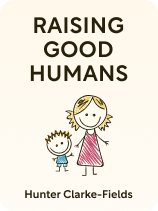

This article is an excerpt from the Shortform book guide to "Raising Good Humans" by Hunter Clark-Fields. Shortform has the world's best summaries and analyses of books you should be reading.
Like this article? Sign up for a free trial here.
What’s Raising Good Humans by Hunter Clarke-Fields about? Are you tired of feeling like parenting is a power struggle?
Raising Good Humans encourages parents to incorporate mindfulness into their daily routines. Clarke-Fields’s structured approach to navigating modern parenting involves being patient, parenting intentionally, and fostering relationships built on mutual respect and understanding.
Read below for a brief Raising Good Humans book overview.
Overview of Raising Good Humans
Hunter Clarke-Fields’s book Raising Good Humans is a guide for parents and caregivers who want to work with their kids instead of always feeling like they’re fighting against them. Drawing on principles from mindfulness, she offers a philosophical approach to parenting and a hands-on manual to navigate the complexities of parenting today with patience and understanding. The book is a helpful resource for anyone looking to approach parenting with intention and build relationships with their kids based on mutual respect, understanding, and love instead of power and coercion.
Clarke-Fields is a mindfulness mentor and coach who has taught her techniques to thousands around the world. She also hosts the Mindful Parenting podcast and is the creator of the Mindful Parenting online course. With over 20 years of experience in meditation and yoga, Clarke-Fields empowers parents to cultivate mindfulness in their everyday lives, helping them balance parenting and self-care. Her expertise is focused on guiding parents to transition from reactive methods to more conscious and peaceful approaches to raising children.
The Key to Raising Good Humans
According to Clarke-Fields, the key to raising good humans is to build a strong relationship with your kids. If you have a strong relationship, she explains, your children will want to work with you to resolve conflict (at least most of the time).
Clarke-Fields’s relationship-based approach shifts the focus of parenting from getting your kids to “behave” to understanding the emotions and needs underlying their (mis)behaviors. She reminds us that kids are people too—with their own needs, wants, fears, and desires. She argues that prioritizing connection and fostering an atmosphere of mutual respect and empathy allows parents and children to grow together and deepen their understanding of each other—creating families where each member feels valued, heard, and genuinely cared for.
According to Clarke-Fields, “mindful parenting” can help you build a stronger connection to your child. In the next section, we’ll explain what mindful parenting is and how it can help you be a more effective and intentional parent.
Mindful Parenting
Mindful parenting is a compassionate, awareness-based approach that helps you focus on being present and emotionally available for your children. Clarke-Fields argues that practicing mindful parenting can fundamentally change how you interact with your kids. It’s about showing up fully, even for little moments—listening intently, empathizing, and responding thoughtfully rather than reacting instinctively when you get frustrated or upset. According to Clarke-Fields, when you begin to practice mindful parenting, you can strengthen your relationship with your children while also modeling for them how to handle emotions and stress in a healthy way.
Clarke-Fields emphasizes that an important part of mindful parenting is not judging yourself for making mistakes or having moments of disconnection with your kid. She acknowledges that parenting is hard and that perfection isn’t the goal. She points out that “mistakes,” or moments of conflict, are opportunities for you and your child to learn, and for you to practice self-awareness and humility—both valuable skills to model for children.
In the next section, we’ll discuss how to start practicing mindful parenting.
The Inner Work of Mindful Parenting
According to Clarke-Fields, the journey of mindful parenting starts with you—you need to pay better attention to what’s going on internally before you can focus on your relationship with your kids. When you know what sets you off and how to take care of yourself, it becomes easier to make intentional parenting decisions that strengthen connection instead of impulsive, or reactive, decisions that harm connection.
Use Mindfulness to Self-Regulate
It’s harder to navigate conflict with kids when you’re angry, frustrated, stressed, or overstimulated—in short, when you have an elevated stress response. Moments of high stress trigger your brain to go into fight or flight mode rather than problem-solving mode. This means when you’re stressed, you’re more likely to react impulsively instead of intentionally.
Clarke-Fields encourages parents to cultivate a personal mindfulness practice as a tool to help regulate their emotions in moments of high stress. She argues that a mindfulness practice will help reduce your reactivity as you begin to build a habit of staying present. Over time, you’ll become more aware of your thoughts and feelings.
Clarke-Fields offers three ways to weave mindfulness into your daily life:
1. Start a meditation routine. She recommends dedicating some time each day (5-10 minutes) to a formal meditation practice.
2. Practice mindfulness during everyday tasks. Clarke-Fields recommends picking an ordinary task like brushing your teeth or washing dishes. Try to concentrate fully on what you’re doing—the sensations, motions—and nothing else.
3. Pay attention to your body. Throughout the day, take time to pause and notice any tension or discomfort in your body. When you have intense emotions, where do they sit in your body? For example, do you feel anxiety in your throat or your belly? Does anger stay in your jaw? Pay attention to what happens in your body as feelings arise and dissipate.
Become Aware of Your Triggers
According to Clarke-Fields, a regular mindfulness practice will not only help you become less reactive, but it will also help you understand why you respond so strongly in certain situations. Using mindfulness to increase self-awareness will help you better identify patterns and root issues that may be fueling your stress and making parenting harder.
Clarke-Fields recommends supplementing your mindfulness practice with reflective writing exercises. She suggests starting by reflecting on how you were raised. For example, growing up, how was love expressed? What about anger? Frustration? Sadness? How was behavior punished or rewarded? Reflecting on these early childhood experiences will help identify patterns of behavior you’ve modeled after your parents or adopted as a coping strategy. Then you can consider what you learned from childhood that you want to take with you as a parent, and what you want to let go of.
Clarke-Fields also recommends keeping a detailed log of your triggers. She explains that by documenting who and what triggers you, along with the underlying feelings and external factors like fatigue or hunger, you can identify patterns in your behavior. Tracking provides a more objective perspective on your triggers, making it easier to recognize them and then consider alternative responses.
The author adds that while it’s helpful to be more aware of your triggers, you should also reduce overall stress in your life. Stress is a significant factor in reactivity. By managing your stress effectively, she argues, you’re better equipped to parent calmly and thoughtfully. According to Clarke-Fields, you can reduce stress by exercising, getting enough sleep, and spending time with loved ones. She emphasizes that self-care is not selfish but a necessary component of being a well-regulated parent who can meet their child’s (and their own) needs with patience and understanding.
Accept That Difficult Emotions Are a Part of Life
Clarke-Fields says that developing a mindfulness practice and increasing your self-awareness can help minimize your stress and emotional outbursts but emphasizes that difficult emotions are natural—for parents and children—and you shouldn’t feel any shame for having them. The problem is that, too often, we lack the tools to deal with these difficult feelings in a healthy way. Most people tend to either suppress their emotions entirely and ignore them, or they become overwhelmed by them.
Clarke-Fields offers a third approach: mindful acceptance. This “middle path” involves neither pushing away nor becoming consumed by difficult emotions. Instead, it means taking time to acknowledge and fully experience the physical sensations that arise with your feelings, then allowing them to pass naturally.
Clarke-Fields suggests the RAIN meditation as a step-by-step approach for handling intense feelings in these moments:
- Recognize the strong emotion you’re experiencing and describe it using language that separates you from what you’re feeling. For example, “I am feeling scared” rather than “I am scared.”
- Allow yourself to feel whatever you’re feeling. Avoid judgment or trying to move past the feeling too quickly.
- Investigate the feeling. Be curious. Notice where the feeling shows up in your body. What thoughts accompany the feeling? Are those thoughts accurate or helpful?
- Nurture the feeling. Ask yourself what you need. For example, if you are feeling scared, the scared part of you may need reassurance that you are safe. You could put your hand over your heart and speak kind words to yourself like “This feeling of fear is temporary. I am safe right now.”
Clarke-Fields emphasizes that using this approach to manage difficult emotions takes practice, but the more you do it, the less control your feelings will have over your life and your decision-making. As your ability to self-regulate and your self-awareness increase, it’ll become easier to make intentional decisions that strengthen your relationship with your child.
In the next section, we’ll talk about how mindful parenting can help you build a stronger relationship with your kid, even when you’re in conflict.
How Mindful Parenting Can Minimize Conflict
Mindful parenting recognizes that conflicts often arise when there are competing needs between a parent and a child. Rather than resorting to power struggles or permissiveness, mindful parenting aims to resolve conflict through mutual understanding and collaborative problem-solving. While Clarke-Fields acknowledges that yelling, timeouts, and threats may get your kid to behave in the short term, especially when they’re young, these strategies will degrade your relationship over time. If your child complies with your request or changes their behavior, it’ll be out of fear, and it will only build resentment and anger.
When you’re having a conflict with your child, says Clarke-Fields, you need to listen, communicate respectfully, collaborate to find a solution, and then take time to reconnect afterward.
Listen
Listening lays the groundwork for a stronger relationship, writes Clarke-Fields. When you really listen to your kids, you send them the powerful message that they matter. It’s not just about hearing what they say, but tuning into their emotions and understanding their perspective. When children feel understood, they’re more likely to open up and share more of their thoughts and feelings. This creates a positive feedback loop where both parent and child feel more connected.
Clarke-Fields says that when conflicts come up, pay close attention to what your child says to figure out the real reasons behind their actions or complaints. This means looking beyond the immediate problem, and understanding the deeper issue—the “why.” Often, there is some need that is not being met. Understanding the unmet need will help you tackle the root cause of the problem instead of just applying quick fixes that don’t solve anything long-term. For example, if your child gets angry when you ask them to clean their room, they may have an unmet need for autonomy or time to relax, or even guidance and instruction on where to start cleaning.
Moreover, says Clarke-Fields, when kids see their parents genuinely trying to understand them without jumping straight into lecturing or punishment, they’re far less likely to get defensive and more likely to be open-minded about finding mutually acceptable solutions.
Communicate Respectfully
If you want to be closer with your child, communicate with them respectfully. Clarke-Fields says that when you’re frustrated, it’s tempting to communicate in ways that emphasize your power in the relationship—demanding, threatening, or dismissing—to get your kid to comply with your request. However, these approaches often signal to your child that they’re a problem to be fixed rather than a person with their own thoughts and feelings, which will hurt your relationship over time.
Clarke-Fields writes that to shift away from these counterproductive patterns, refocus requests on “I” statements rather than “you” accusations. Express your own unmet needs instead of attributing blame. For example, instead of yelling “No yelling,” you could say, “When you yell, I feel overwhelmed and can’t focus.” This strategy both allows you to advocate for your needs and serves as a vital lesson for your child. It teaches them to consider how their actions impact others. It also gives them a model to name what they’re feeling when their needs aren’t met.
Clarke-Fields acknowledges that “I-messages” are not perfect tools, but as you use them more, your child will learn they can trust you to treat them with respect and consideration and will be more willing to cooperate. She advises being patient when adopting new communication strategies as it may take time to build back trust with your kid.
Problem-Solve Together
While respectful communication might help you manage smaller conflicts, you may need additional tools for bigger conflicts. Clarke-Fields advocates for a strategy she calls “win-win problem solving.”
Win-win problem solving is a collaborative approach to resolving conflicts that ensures everyone’s needs are met rather than having one person begrudgingly concede to the other. According to Clarke-Fields, this method helps find solutions that everyone’s happy with.
Win-win problem solving includes the following steps:
1. Identify everyone’s needs. Write them down. This helps your child recognize that you believe their needs are important. Sometimes needs are presented as solutions. For example, “I need to get my driver’s license” may be your child’s solution to “I need independence.” You may need to help your child discover an underlying need.
2. Brainstorm as many solutions to the conflict as possible. Encourage your child to present their ideas first. Write down every idea even if you don’t think they’re realistic or you disagree.
3. Identify which solutions meet both of your needs. Circle those solutions.
4. Discuss the solutions thoughtfully, and then choose one. Make sure to add any details that need clarification, especially if there are deadlines or responsibilities to follow through on.
5. Check in on the solution at a later date to see if it’s still meeting everyone’s needs and if you need to make any adjustments.
Reconnect After Conflict
When you’ve had a conflict with your child, it’s important to reconnect afterward. This helps release tension in the moment and also builds a foundation of trust and understanding that strengthens your relationship in the long term.
Clarke-Fields suggests using Zen master Thich Nhat Hanh’s Beginning Anew framework as a tool for reconnection:
1. Start with appreciation. Begin by acknowledging your child’s strengths and positive contributions to the family or the situation. This sets a positive tone and reminds both of you of the value each brings to the relationship.
2. Own your mistakes. Be open about any mistakes you made or things you wish you’d done differently. Expressing these regrets shows your child that it’s OK to make mistakes and that taking responsibility for them is what matters most.
3. Express hurt without blame. Tell your child how certain things they said or did made you feel. This is another opportunity to use “I-messages.” Say “I felt sad when…” instead of “You made me sad by….” This avoids placing blame directly on them, reducing their need to be defensive, and opens up space for empathy.
Reconnecting after conflicts using this framework isn’t just about fixing a single issue—it’s an investment in your parent-child relationship’s emotional depth and resilience for years ahead.
Invest in Your Relationship With Your Child
According to Clarke-Fields, building your relationship with your child doesn’t happen all at once. It takes time. To strengthen your connection, she recommends two key practices: spending focused time with your child and creating a simple, low-stress environment at home.
Spend Intentional Time With Your Kids
Setting aside intentional time means actively carving out periods in your day exclusively for connecting with your child, undistracted by your to-do list or the messy house. This isn’t about squeezing them in between emails or chores; it’s about fully being there with them.
Focused play is a powerful tool for this. When you play with your child, giving them your full attention, it makes the play more enjoyable and deepens the bond between you. During these moments, engage with whatever activity they’re interested in—whether that be building blocks, drawing, or storytelling—and don’t try to redirect their play or multitask.
Clarke-Fields recommends telling your child that you’re going to focus only on them. Then, set a timer, and do your best to only pay attention to them for that time period.
Simplify Your Life
Clarke-Fields also explains that your home environment and schedule have an impact on your relationship with your child. Busy schedules and cluttered environments increase stress—both for you and your family. Simplifying your living space reduces distractions and stressors, making it easier for everyone to engage more deeply in mindful interactions.
To simplify your life, Clarke-Fields recommends taking time to simplify your stuff, simplify your schedule, and minimize screen time.
First, she suggests you declutter the house as a whole family. Choose toys and belongings that hold genuine value or bring joy; donate what no longer serves these purposes. She also recommends establishing predictable, realistic routines. Regular schedules reduce chaos. Make sure your schedule has plenty of time for free play, relaxation, and connection.
Finally, Clarke-Fields suggests minimizing screen time—for you and your kids. She explains that it’s up to you to model healthy behavior. She recommends having phone-free times or spaces that allow the whole family to disconnect from screens in order to be more present with each other.

———End of Preview———
Like what you just read? Read the rest of the world's best book summary and analysis of Hunter Clark-Fields's "Raising Good Humans" at Shortform.
Here's what you'll find in our full Raising Good Humans summary:
- How to use mindfulness to manage emotions—both yours and your child's
- Four steps to resolving conflicts with your child
- Practical strategies for creating a simple, low-stress environment at home






